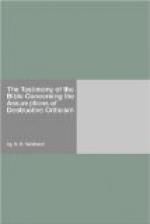In the fulfillment of this promise they have given us the testimony of God, the Holy Spirit, on all the subjects of which they have written. What, therefore, is their testimony concerning the author of the book of Isaiah? Did that prophet write the book, or is it a patched book from various authors?
Matthew, the inspired author of the book that bears his name, quotes from Isaiah xl. 3: “The voice of him that crieth in the wilderness, Prepare ye the way of the Lord, make straight in the desert a highway for our God.” (See Matt. iii. 3.)
The critics inform us that this prophecy was not given by Isaiah, but by some unknown prophet, and was bound up with Isaiah’s prophecies, and labeled as his. Matthew informs us that it was a prophecy concerning John the Baptist, and was given by Isaiah himself, and not by another. He says (iii. 3), referring to John the Baptist: “For this is he that was spoken of through Isaiah the prophet, saying:
“The voice of one crying in the wilderness, Make ye ready the way of the Lord, Make his paths straight.” (R.V.)
Again, in Matt. viii. 17, the author of this gospel quotes a passage from the fifty-third chapter of Isaiah. The critics have handed this fifty-third chapter over to the Unknown prophet or prophets. They affirm again that the theme and literary style of this chapter are such that Isaiah could not have written it. They base their affirmation on their own literary discoveries, their ability to detect the footprints of some other prophet, though they do not inform us who that prophet is. They are sure that it was not Isaiah, for they have already placed him under such limitations that, according to their critical decision, he could not write the chapter. Of course, their conclusion is reached by practically denying the Holy Spirit’s agency—logically denying that “holy men of God spake as they were moved by the Holy Spirit.” (2 Peter i. 21.)
The inspired author of the gospel of Matthew had a different conception of the Holy Spirit’s agency in giving prophecy to the world. He had not discovered the limitations of the prophet, which the critics profess to have found. Hence, in giving the history of God’s gracious and miraculous work of casting out demons and healing the sick, he declares (Matt. viii. 17), without a shadow of a mistake, that Christ wrought these miracles, “that it might be fulfilled which was spoken through Isaiah the prophet, saying, Himself took our infirmities and bare our diseases.” (See also Isaiah liii. 4.)
As Matthew is on the witness stand, the reader will be interested to hear his testimony further. In his gospel (xii. 17-21) he testifies that Isaiah wrote the forty-second chapter of the prophecy that bears his name. Matthew quotes the first four verses of the chapter, in explanation of the fact that Christ found it necessary during his ministry to retire from the public excitement which his teaching




